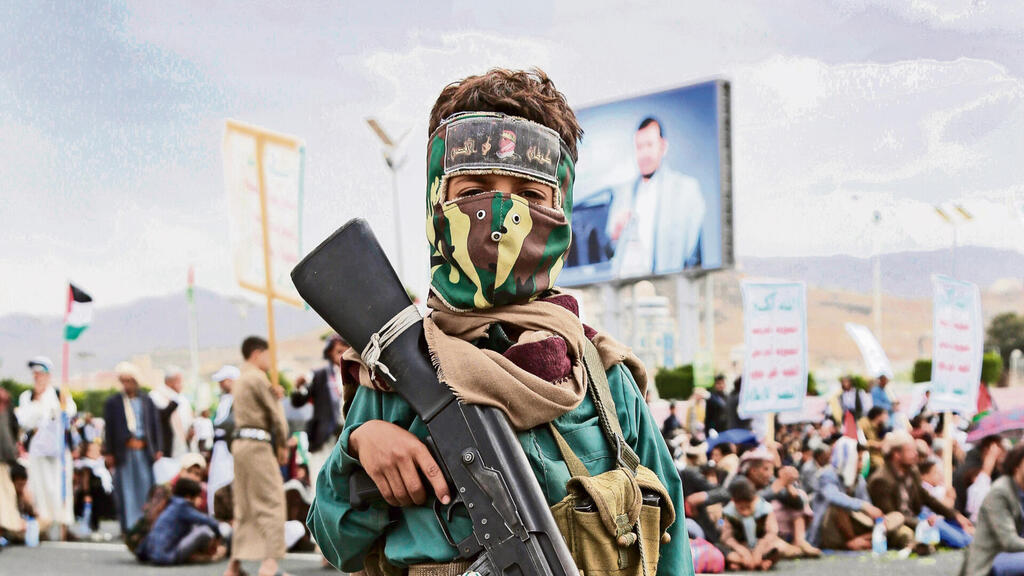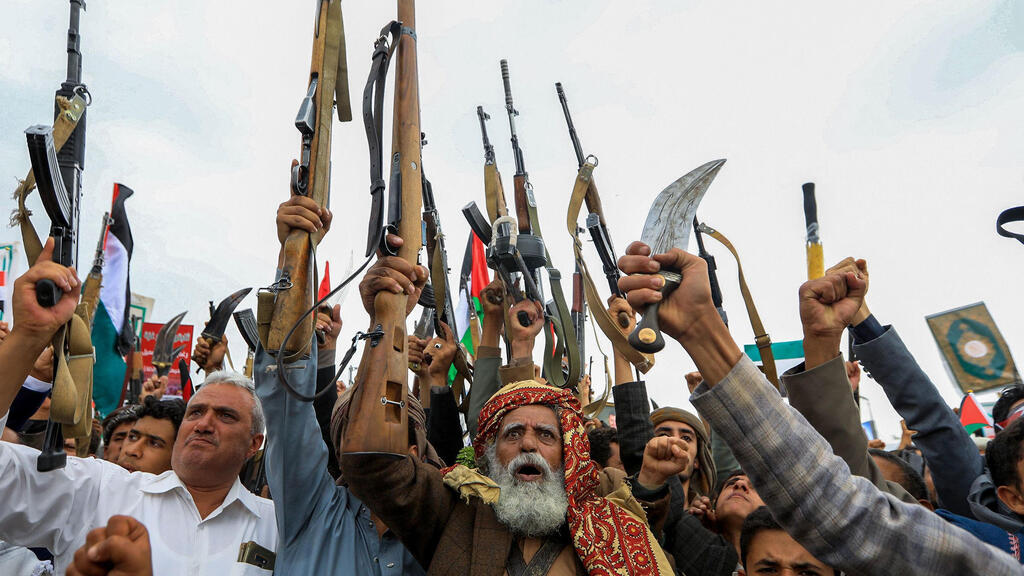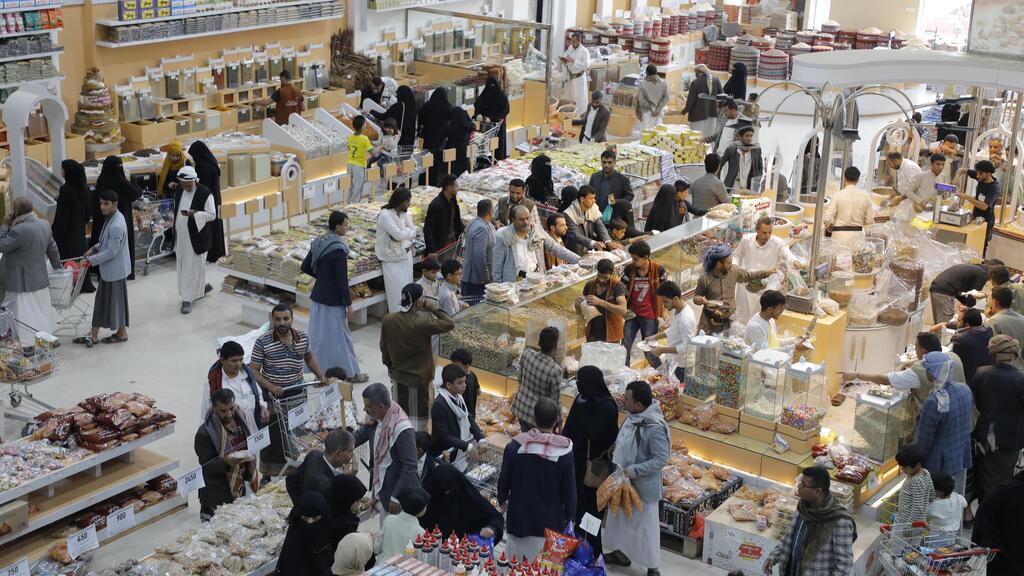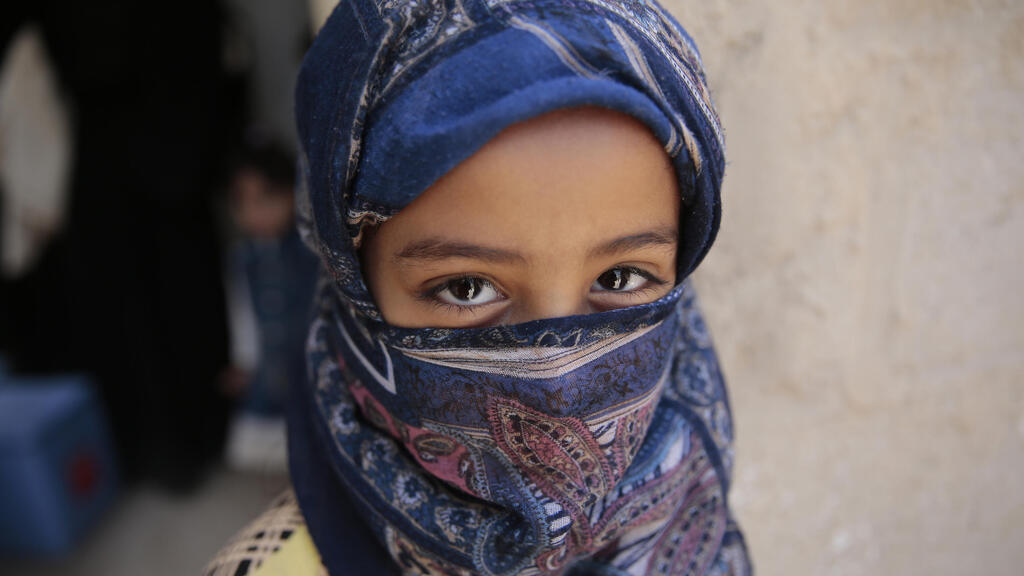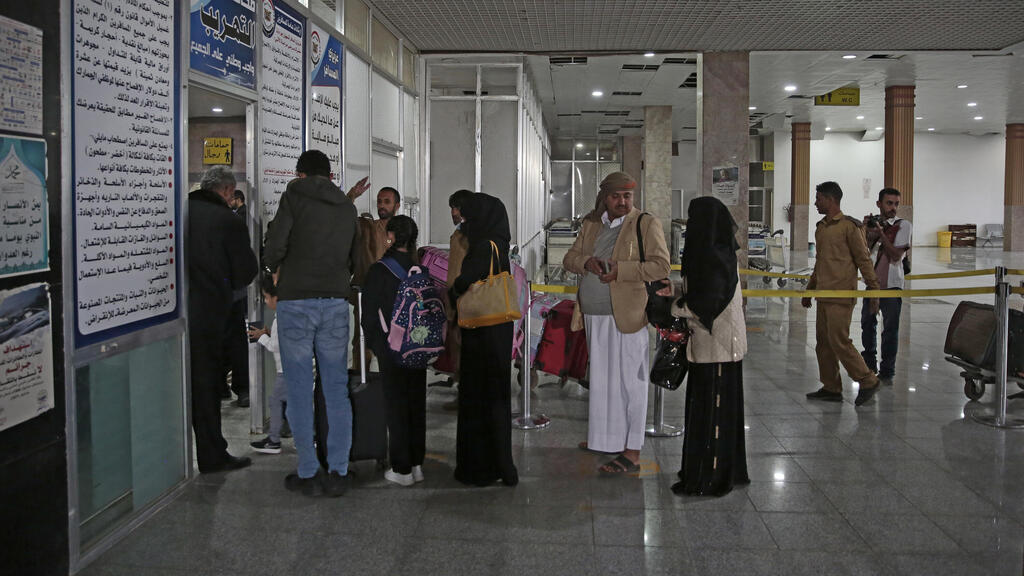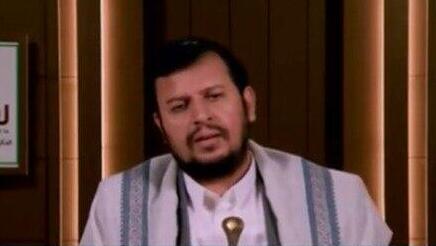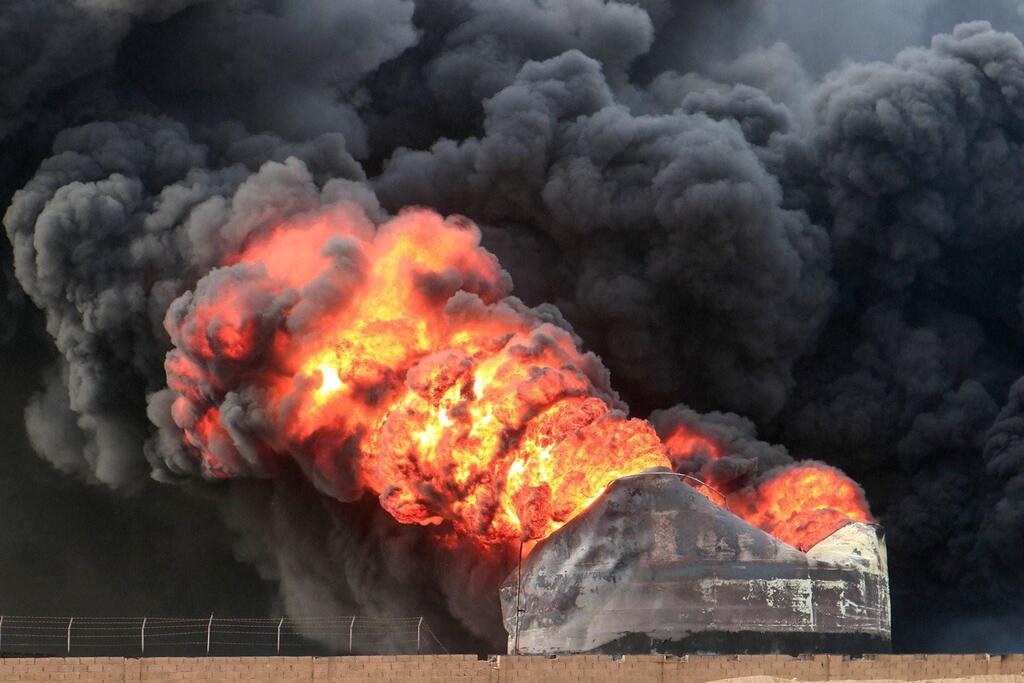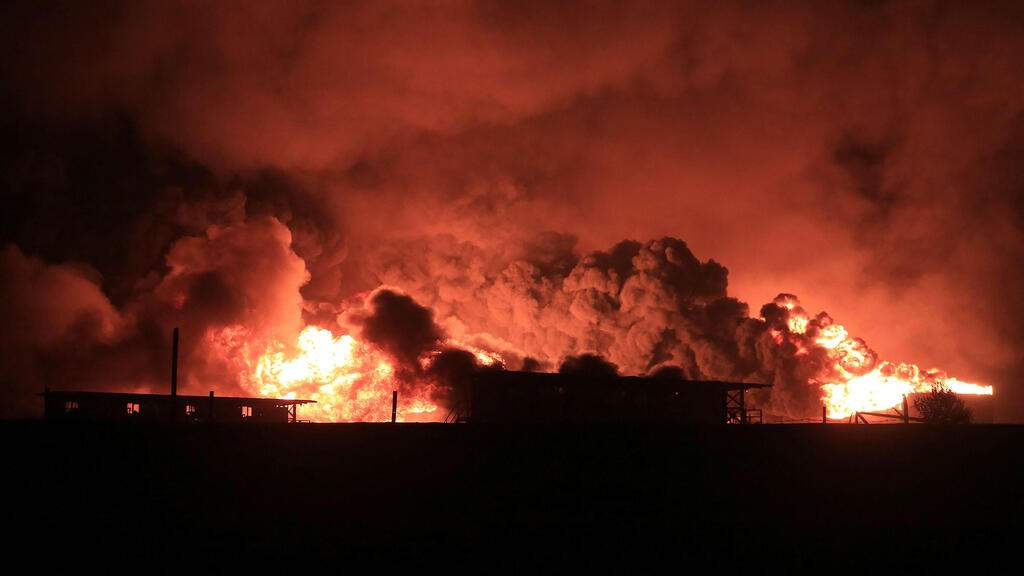Getting your Trinity Audio player ready...
Zeinab (“I’m sure you understand why I can’t give my last name”) has been living in a tent complex in the city of Hodeidah close to a large Yemeni port where IAF planes operated during the attack in the area.
Zeinab, 29, is a mother of four Sunni Muslims who wears a dark hijab. “I’m busy all the time,” she says. “I cook, clean, do laundry and take care of the children.” Her parents had her married at fourteen. “It was weird. The first time I saw my husband was at the wedding.”
Her 57-year-old husband Mohammed, who divides his time between his three wives, exports locally produced honey to Dubai and the UAE. “Our honey,” she says proudly, “provides livelihoods for the extended family. He has an excellent reputation in the Arab world and I know his honey is exported to other countries from Dubai.”
The honey business supports three wives, 11 children and Mohammed’s parents. It’s a joint effort: The women mix the honey solution in massive vats, heat it, cool it and then pour it into little jars onto which Yemeni export labels are affixed. Mohammed then loads the goods into huge sacks and transports the jars to Dubai, Oman and the Emirate of Sharjah.
Can you read and write?
“Like all girls my age, I didn’t go to school regularly, but I’ve managed to learn all the letters and I can recognize words and put together short sentences. I don’t read newspapers, but I watch Yemeni TV channels.”
Can you get other TV channels?
“My TV is only tuned to local channels. They warned me that if I were caught watching Arab TV channels from outside Yemen, they’d confiscate our TV and that I could get into trouble.”
Western channels aren’t even an option as Zeinab has never learned any language but Arabic.
A relative of Zeinab’s, who has been living in the United States for over a decade, made our connection. He’s an educated man who represents the research institute where he works on international panels. When he gave me her phone number, he explained that she knows I’m a journalist, but that it would be best not to tell her I’m Israeli. Zeinab cooperated freely, but asked me to ensure her identity was not revealed.
When I asked her about Israel’s attack on Hodeidah Port in response to the UAV attack on Tel Aviv killing Yevgeny Ferder, she described the shock and surprise. “My 15-year-old son woke up in the middle of the night, ran around the area for a bit, and came back telling us about the ‘Zionist’ attack in response to our attack on Tel Aviv,” she says.
“I, obviously, didn’t know very much about our attack. I immediately asked my son whether we needed to look for somewhere else to hide. He said, ‘Thank God, it’s all over’ and, for now, there’s no reason for us to change our daily routine. I also asked the neighbors who knew more about it. They said that we now have three enemies: Saudi Arabia, the Houthi regime, and Israel. I don’t know who to be more afraid of.”
What do you know about Israel?
“Terrible things, and I’m afraid of another attack and not being protected. When my husband comes, I’ll ask him if we need to look for somewhere safer.”
Zeinab tells me that she’s financially better off than her neighbors and that she and her children are not hungry. “I give people food regularly. To avoid bringing shame on anyone, I leave it by the tent or hut doorway and quickly leave. You can’t imagine the terrible famine in Yemen in recent years. We hear that aid is coming from international organizations, but the Houthis have taken control of the port.
"They take the aid and food packages, the medicine and bottles of drink, and give it to their cronies. We’ve been fortunate enough to have made a connection with a representative of one of the aid organizations who hide food packages for my husband when shipments arrive. The problem is that we never know when the shipments are coming - so we have to keep our eyes peeled so that they don’t steal it.”
Are pharmacies and grocery stores open?
“That’s a rather odd question. It’s clear you’re not from here. Of course we have shops. The question is what the shopkeepers choose to put on the shelves and how much they charge. Everyone talks about stockpiling foods to sell on the black market. We’ve learned not to trust the shopkeepers.”
Do the Houthis bother you?
“I never run into them. My husband has taught me how to lead a quiet life and take care of the children.”
'Death brides'
An aid activist working at Hodeidah Port put me in touch with Omran who also doesn’t know I’m Israeli. Omran tells me about his baby son who died of starvation. “His mother’s milk dried up, so she fed him pieces of pitta bread soaked in water, with some cheese and a few vegetables.
"At some stage, the aid packages stopped coming and the neighbors couldn’t give us pitta bread anymore as they needed it for themselves. The suffering and frustration are hard to imagine. The mother was hungry and the emaciated baby contracted cholera and died.”
Have you tried asking the Houthis for help?
“We have no way of contacting the Houthis. Their trucks drive across town with the aid, straight to government offices. We have no money to offer them. I now have to take care of my two wives and five children, keeping them alive. Even if you were to send me a food package with my full name on it, it wouldn’t get to me as one of the cronies would nab it.”
Of the 33 million people in Yemen, the poorest of the Arab countries, 80% live in extreme poverty. The recent famine has led to the horrific zawaj al hamis (Thursday weddings): Men in their 50s and 60s show up in Yemen from the Gulf States, or send a simsar – a pimp – to find 11 to 13-year-old girls for a three-day “marriage.”
The girl then returns home with a small sum of money and the fear of learning she’s pregnant a few weeks later. In such cases, the family seeks the services of a daya, an elderly woman who carries out abortions, that invariably ends with the girl dying of complications from infections.
“We’ve come to terms with this,” says Zeinab. “In our family, we’ve also had girls who got into trouble. We call them ‘death brides’. When a father hands over his daughter, he definitely knows the dangers, but you must realize, he’ll get a sum of money that can keep a family for at least two months.”
Yemen became a unified republic in 1990 when the north and south, that had been separate, united. Civil war broke out following unification, with the South vying for independence. The conflict gradually turned more violent, with the Saudis and UAE intervening in internal politics, sending arms reinforcements. In 2015, Saudi Arabia established a U.S. and UK-backed coalition designed to reinstate the Sunni regime and eradicate the Houthis.
Inbal Nissim-Louvton, who researches Yemen at a regional think tank and lectures at the Open University, says that as the civil war in Yemen and the conflict with Saudi Arabia intensify, the marriages of minors become more widespread.
“Aid organizations from Germany have been trying to protect children in recent years,” she says. “They’ve been trying to stop the pressganging of ten-year-olds into the Houthi army and put an end to the ‘marriage’ of minors. The severe situation, however, means that families are trying to get rid of their daughters and find someone to support them.”
This severe situation has also caused at least one-third of the population, mostly young people, to migrate internally. They leave their families in the villages and move to the capital Sanaa in search of work and accommodation.
The Houthi cities of Saada, (hometown of Houthi leader Abdul-Malik al-Houthi, the younger son of cleric Sheikh Badreddin al-Houthi) and Amran have amalgamated. Reality bites in the big city as young people are often not actually paid their wages. Those unable to emigrate overseas are forced back to their villages, struggling to deal with daily realities of food shortages.”
Adham Selmiya lives in the Sunni-majority city of Aden, Yemen’s temporary capital. “I’m a hardworking, guy with a good heart, leading a simple life,” he writes on X (formerly Twitter). “Let me tell you about myself: I was married and have a small son in his mother’s custody until he’s six, when I get him. I can’t leave Yemen right now as flights to Europe or the United States require visas – especially for Yemenis – as well as inspection from the Yemeni side and approval from the country you want to go to.”
“Trust me, everyone my age in Yemen, Sunnis and Zaydi Shiites (Houthis) alike, want to emigrate - but not to the countries willing to take us. I don’t want to go to Iran or Korea. I want an agreeable Arab country where I can talk to the locals in our language. I’ll work any job to make a modest living. I’m sure that if I can make it work in an Arab country, my parents could take care of my son until I return and remarry. A man can’t lead a normal life without being married to at least one woman.”
Despite his dream of emigrating and building himself a better life, Adham is also convinced that a war against Israel is imperative. “I’m sure the world is following what’s going on in Yemen right now, because of the war against Israel. We hit them hard by surprise and they dealt our honor a blow at Hodeida Port. And the story’s not over yet. We’re now refocusing on Saudi Arabia, and the Zionists are going to get a shock they never dreamed possible.”
The mysterious leader and anger in Iran
The Houthis took control of the capital Sanaa in 2014 expelling President Abdrabbuh Mansur Hadi who was immediately embraced by the Saudi royal family. The United States was quick to label the Houthis “terrorists” and demanded their Al-Masirah TV channel be shut down. The EU, meanwhile, imposed a series of sanctions freezing assets and preventing Houthis from leaving for “enlightened countries.”
Yemen currently operates as a state within a state. The Houthi leadership, headed by 44-year-old Abdul-Malik al-Houthi, is situated in Sanaa, the official capital. Very little is known about Abdul-Malik, also known as Abu Jibril.
It’s not clear where he lives, how many wives and children he has, or the volume of wealth he’s managed to accrue. Rumor puts the figure at around $30 billion in Iranian banks. His 16-year-old son Jibril was first disclosed when leaving for Quds Force and Hezbollah training camps in Iran in and Lebanon respectively, surrounded on all sides by Yemeni bouncer-types in tight T-shirts.
A source close to Abdul-Malik says that he leads an ascetic lifestyle, spending his time reading and walking (surrounded by bodyguards). He goes to bed early and keeps in touch with childhood friends. He steers clear of public appearances and conducts meetings via a huge TV screen, his whereabouts unknown.
Lt. Col. (res.) Eyal Pinko, lecturer and researcher at the Begin-Sadat Center for Strategic Studies at Bar Ilan University, demonstrates how Abdul-Malik mimics Hezbollah leader, Hassan Nasrallah. “You see the same hand movements, the same traditional dress. He even teases the Yemeni government in the same way Nasrallah berates Lebanon’s president and chief of staff saying things like, “We’re doing the work for everyone.”
Nissim-Louvton says that the Houthis are not subordinate to Iran and although their interests are common, they view themselves as committed to the Palestinians. “Look at the slogans on the Houthi flag: ‘Allah is Great’, ‘Death to America’, ‘Death to Israel’, ‘Curse Upon the Jews’ and ‘Victory to Islam’.” she says.
In January 2007, the Houthis attacked the homes of Jews who had remained in Saada. They expelled them, took over their land, impounded property and cars, and confiscated libraries, including Jewish books. The words “This was the home of Little Satan” were scrawled in red chalk on the confiscated homes. As far as we know, there are now no Jews at all left in Yemen.
From his new home in Abu Dhabi, Yemini Jew Yosef Hamadi told me that three years ago, the UAE sent an airplane specially to rescue him, his brother and their families from the north of the country. “President Mohammed bin Zayed saved us at the last minute from the Houthis who were threatening to kill us along with the rest of the Jews.”
Homes, cars and free education at a local school awaited him and 14 family members in Abu Dhabi. “I don’t want to think about the Houthis,” he says. “Their cruelty, hatred and discrimination against anyone not of their faith terrifies me to this day. We’re extremely lucky to have been rescued.”
In response to AIF operations at Hodeida Port, Abdul-Malik stated Sunday, “The Israeli enemy (unlike Nasrallah, he almost never uses the term “Zionists”) decided to impress the cowardly Israeli audience, as if it had made some great achievement striking Yemen a severe blow. We declare that this attack won’t stop us from continuing to help Gaza. And it wasn’t a painful blow by Israel.”
The following day, funerals were held for the 14 killed at Hodeidah Port. In addition to those declared dead, six are still classified as missing and 90 were wounded and received medical treatment. The Houthis also disseminated a series of photographs from the hospital where, they claimed, children and elderly people were brought in from the IAF shelling.
It’s unclear what children were doing in the commercial section of the port or whether these are recent pictures. Transport Minister Abdul Wahab Al-Durra and Hodeida Governor Mohamed Qahim also showed up at the bombed port demanding security forces gather photographs, claiming it was for an indictment, although it’s unclear to which international body such an indictment would be filed.
Director General of the Yemen Petroleum Company, claimed the port was bombed multiple times around the clock and that it was back to full operation last Monday. Houthi Spokesman Brig. Gen. Yahya Saree, who has a habit of theatrically reading out military statements, went further saying, “Along with Iranian militia in Iraq, we have attacked ships carrying arms and military equipment at Haifa Port.” No such attack is known in Haifa.
Abdul-Malik calls Israel the “true enemy.” He even said, “We’d have no problem sending combatants in the struggle against (Israel). Yemeni tribesmen are waiting for the moment they can declare war along with our courageous brothers in Hezbollah.”
A source close to Abdul-Malik says that the Iranians berated him for this speech, telling him that he doesn’t make the call on who combines forces with whom, or how the war against Israel is conducted.
On Monday, a Houthi spokesman, politburo member Mohammed Al-Bukhaiti, cautioned Saudi Arabia, “We’ll attack you too” and said that, “Saudi Arabia’s hostile activities toward Yemen, tying you to the Zionist entity, won’t pass without a severe response to the Saudi regime.”
Riyadh, called on all parties to act with restraint and keep residents away from the dangers of war.
Dr. Pinko says the Houthis will carry on attacking Israel. “It looks like the story’s not over for them” he says. Mohammed Al-Bukhaiti was quick to say that further vital and important sites in Israel are on their target. “We’ll attack them too” he promised. “And only after execution, will we announce exactly what we hit, so as to hurt Israel.”
Meanwhile, Dubai's Deputy Police Chief, Dhahi Khalfan openly mocks the Houthi leader online: “Let’s see brave Abdul-Malik come out of his hiding place. What’s he got to do with the Palestinians when he’s a Zaydi Shiite and they’re Sunni Muslims? You want to fight? Let’s go.
"Come out of your hideout and get yourself to the Gaza border. Let’s see you, such a hero. But first, stop stealing property and confiscating aid from innocent civilians. If you must go to war, take your hero Hassan Nasrallah with you – when he leaves the hole where he’s hiding. It’ll do his legs good.”



